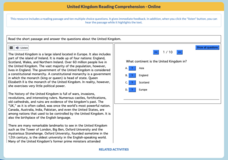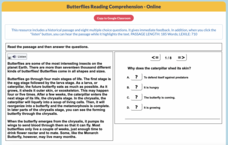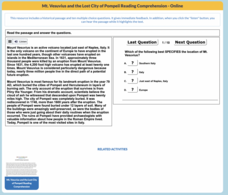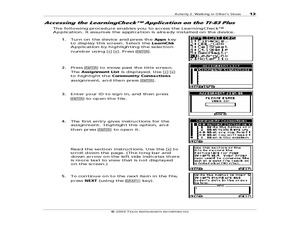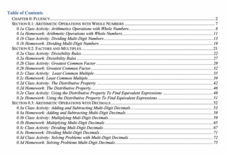Mr. Nussbaum
United Kingdom
An interactive practice tests scholars' reading comprehension skills. Learners read an informative text, then answer 10 questions.
K12 Reader
Kinds of Angles
Have you ever wondered how circles and angles relate to each other? Read a passage about right angles, acute angles, and obtuse angles, and answer reading comprehension questions about the information you learn.
Pearson
Main Idea
The main idea of this resource is that you should take a look if you're planning to teach main ideas in your class! Cover just about everything you need to know about main ideas with a packet of materials that includes information and...
Mr. Nussbaum
Butterfly
An interactive challenges scholars to read a short informational text about butterflies then answer eight questions. A progress report appears after the last question.
Mr. Nussbaum
Mt. Vesuvius and the Lost City of Pompeii
Mount Vesuvius and the lost city of Pompeii are the focus of an interactive reading practice designed to increase comprehension skills. Scholars read an informational text, then answer 10 questions.
K12 Reader
Why Does the Moon Orbit Earth?
Have you ever looked up at the moon and wondered why it looks different every night? Learn about the moon's orbit and the lunar cycle with a reading comprehension exercise. Using context clues, kids find the definitions of unfamiliar...
K12 Reader
National Symbols
What are the most prominent symbols of the United States? Learn about the bald eagle, the American flag, and the Statue of Liberty in a reading comprehension activity that includes a short passage and five reflective questions.
E Reading Worksheets
Comprehension and Inference Question Creator
Encourage learners to ask questions about what they read with a worksheet about comprehension and inference questions. The resource provides directions and examples that guide kids through crafting their own questions.
Curated OER
Using Drama to Examine Communities: Walking in Others' Shoes
Encourage your readers to make connections between texts with this resource. After compiling notes for each text read (you choose the texts), groups craft skits in which major characters from each text meet. There is a rubric for the...
Curated OER
"The Most Dangerous Game" Study Guide
After reading Richard Connell's best known work, "The Most Dangerous Game," have your class complete the 12 study questions included here. Readers answer plot related questions, compare and contrast characters, and analyze story elements.
Curated OER
Lee and the Bee Flee to the Tree
Practice the strategy of decoding to become fluent readers with young scholars. They interact with the correspondence ee=/E/ as it deals with speech and text. The tongue twister, "Why did Lee and the bee flee to the tree?," is also...
Have Fun Teaching
Making Inferences (18)
Here's a bright idea. Model for readers how to use what they know about a story and combine this knowledge with clues from the text to formulate inferences about the story.
Utah Education Network (UEN)
Fluency
Become fluent in the language of mathematics. Scholars learn to divide multi-digit whole numbers as well as see how to determine the greatest common factor and least common multiple. They also investigate how to apply the distributive...
Curated OER
Test Your Spelling Skills Read>Cover>Write>Check>Correct No. 5-- Family Words
In this spelling instructional activity, students analyze a list of 20 family words. Students are asked to use the strategy of read, cover, write, check and correct in order to learn to spell the words.
Curated OER
My Antonia: Magic Squares (Vocabulary Strategy)
Help your pupils discover the power of context clues by teaching the this vocabulary strategy. Designed to go with words from Willa Cather's My Antonia, this exercise focuses on having individuals use their own words to define new...
Curated OER
Peter and the Starcatchers: K-W-H-L Strategy
Bookend your study of Peter and the Starcatchers with a KWHL centered around treasure and power. Pupils work in small groups to compile knowledge and questions and then revisit this chart after reading and research.
Curated OER
Flipped: After Reading Strategy
Everyone can be an expert! After finishing Wendelin Van Draanen's book Flipped, divide your class into small groups. Then, assign each group a topic to become experts on. The resource suggests topics such as characters, themes, setting,...
Novelinks
The Winter’s Tale: Problematic Situation
Before beginning The Winter's Tale groups read and discuss a scenario that parallels the plot of Shakespeare's play. They then brainstorm possible solutions to the problem.
Curated OER
The Berenstain Bears and Too Much Teasing
More of a worksheet than a complete lesson plan, this resource includes several pre-reading and post-reading discussion prompts for The Bernstein Bears and Too Much Teasing. The prompts on this worksheet are designed to help young...
Curated OER
Double Dip: Using Multi-Meaning Words
Double dip ice cream cones are a fourth grade favorite, and now they come in vocabulary and context flavor. Learners practice using double meaning words as they construct ice cream cones that contain two sentences showing how context can...
Curated OER
Graphic Organizers for Good Science Reading and Writing
Students use reading and writing strategies to explain informational text in science. They create and use different types of graphic organizers to understand, interpret, and analyze informational text.
Learning Station
Scan It
In this reading strategies worksheet, students will learn how to scan for information. Then students will scan a non-fiction passage about weather and complete 4 short answer questions.
Curated OER
Taking a picture Walk
First graders use question words to answer comprehension questions. In this reading strategies instructional activity, 1st graders use picture cues and predict events in a story. Students use context clues to understand unfamiliar...
Curated OER
Improving Elementary Reading Literacy
Students enhance their literary skills through phonemic awareness. For this reading development lesson, students read several storybooks and analyze the phonetics, vocabulary, and overall story. The students then rewrite what they have...


